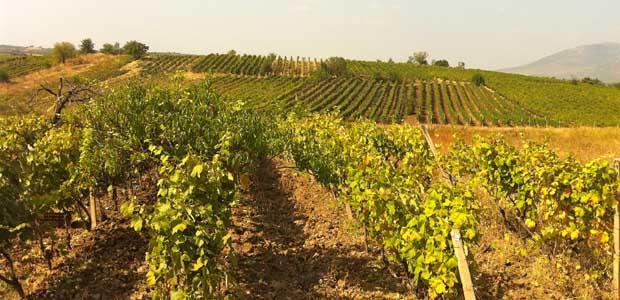Kosovo Wants to be the Next Napa
Rahovec, Kosovo, is said to get 270 days of sunshine per year. Growers and vintners say the climate is perfect for a wide variety of grapes. (Photo: Nate Tabak)
Behajdin Durguti goes vine to vine, as he’s done for the past 30 years, clipping clusters of Riesling grapes and tossing them into a bucket. Customers have come from neighboring Albania, where they use his grapes to make white wine and a potent brandy called Rakia.
Durguti has to turn customers away; a devastating winter here destroyed much of his crop.
It’s little solace for grape growers like Durguti, but there’s been a surge in demand for Kosovo grapes. That’s a positive sign for a once-thriving wine industry that’s trying to make a comeback.
Kosovo’s wine country, Rahovec, doesn’t have much name recognition outside of the region, though it’s been making wine for some 2,000 years.
Cheap table wine once flowed from Kosovo to the rest of Communist Yugoslavia and other parts of Europe. But the wine industry here collapsed as Yugoslavia fell apart and Kosovo plunged into war in the 1990s. After the war, vintners basically had to start over.
Now, as quality and capacity improve, more people are getting a chance to try what Rahovec has to offer.
According to Miro Brkic, it’s the perfect place to make wine. A retired economist-turned vintner, Brkic said Rahovec, with its 270 days a year of sunshine, is well situated. Go south to Macedonia, and the grapes have too much sugar. To the north in Serbia, they’re too acidic. In Rahovec, he said, they’re just right.
In the cellar of Kosovo’s largest winery, Stone Castle, the air is thick with the scent of oak and wine. Some 5 million liters of wine, including pinot noir, merlot and chardonnay, age in massive barrels.
Shani Mullabazi, Stone Castle’s general manager, sips a glass of the 2010 chardonnay.
“It’s a fresh wine. Has a really optimal acidity. It’s crispy, very good in the mouth,” Mullabazi said.
Americans got a chance to sample some Stone Castle wines this summer. The winery sent a small shipment to New York City, where there’s a large community of Kosovar Albanians.
“We have a very good Diaspora in the US,” Mullabazi said. “They have very good friends, American friends, and they’re drinking our wine together.”
The wines aren’t pricey; they top out at about $12 a bottle. The winery sends even cheaper table wines to Germany. But it would like to break into the lucrative American market as a destination for its higher-end productions, including pinot noirs and cabernets.
That’s a lofty goal for a country virtually unknown on the global wine scene. But another Rahovec winemaker, Visar Hajrullaga, said Kosovo is undergoing a wine revolution.
Hajrullaga’s winery looks like a mom-and-pop operation; no stainless steel tanks or oak barrels. The finished product goes into two-liter plastic bottles. But Hajrullaga is doing something different here, with his vranac grapes, native to the Balkans.
“This grape juice will give wines with 14,” he said, meaning 14 percent alcohol. That’s unusual for Kosovar reds, which generally don’t exceed 11 percent.
Hajrullaga has been studying up on the latest winemaking techniques with the help of the German government. He said once winemakers here get up to speed, they’ll be a force to be reckoned with.
“Kosovo has a big potential for the wine industry,” he said.
That potential is something Warren Richard, a high school teacher who blogs for the website Virginia Wine Time, tasted when he sampled Kosovar wine for this first time this summer. He said Kosovo should aim to make itself known for a particular kind of wine – like California for Chardonnay and Italy for Chianti.
“I think the wines from Kosovo could have a place in the supermarket or the wine shop,” Richard said. “The biggest challenge is going to be recognition.”
Hajrullaga, the winemaker, expects that recognition to come with vranac. His vranac will soon appear on Kosovo supermarket shelves in proper wine bottles with sleek labels. It’s the first step, Hajrullaga said, to giving his wine a global stage.
Every day, reporters and producers at The World are hard at work bringing you human-centered news from across the globe. But we can’t do it without you. We need your support to ensure we can continue this work for another year.
Make a gift today, and you’ll help us unlock a matching gift of $67,000!
